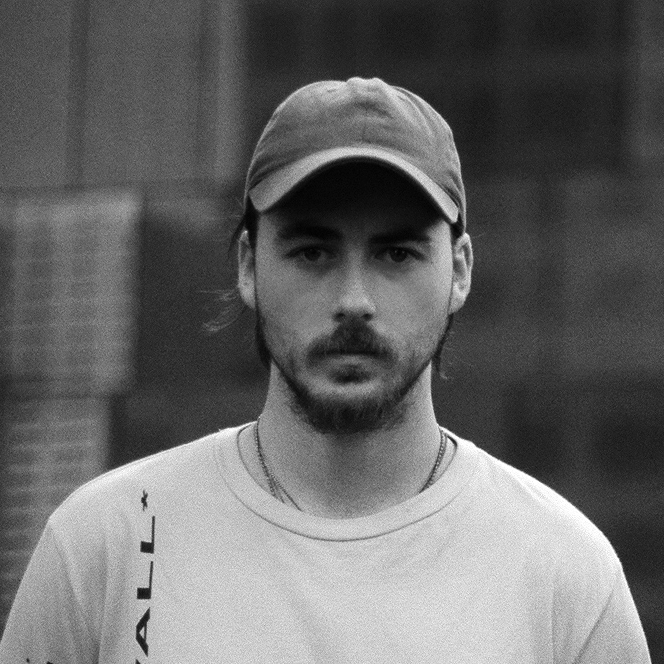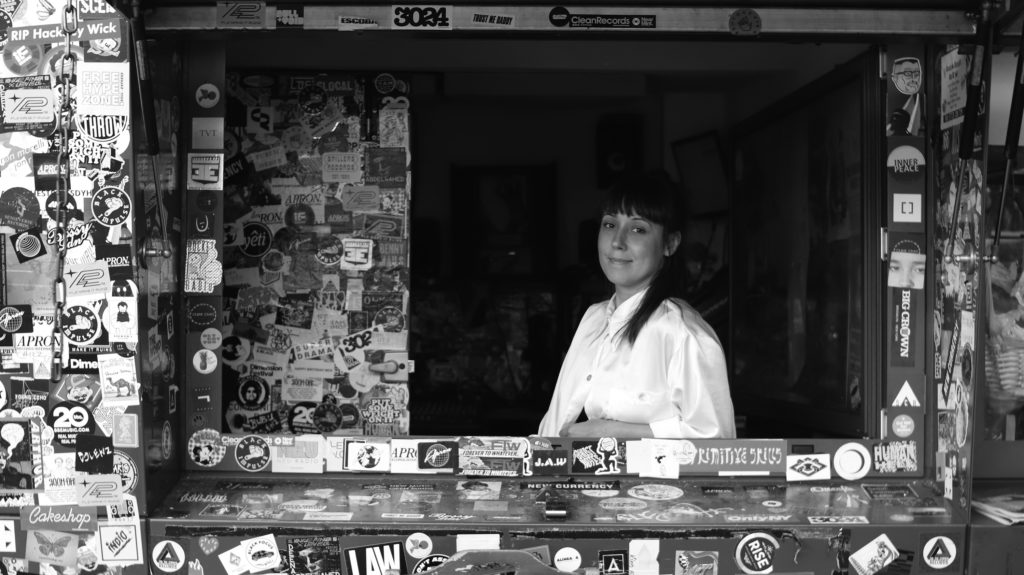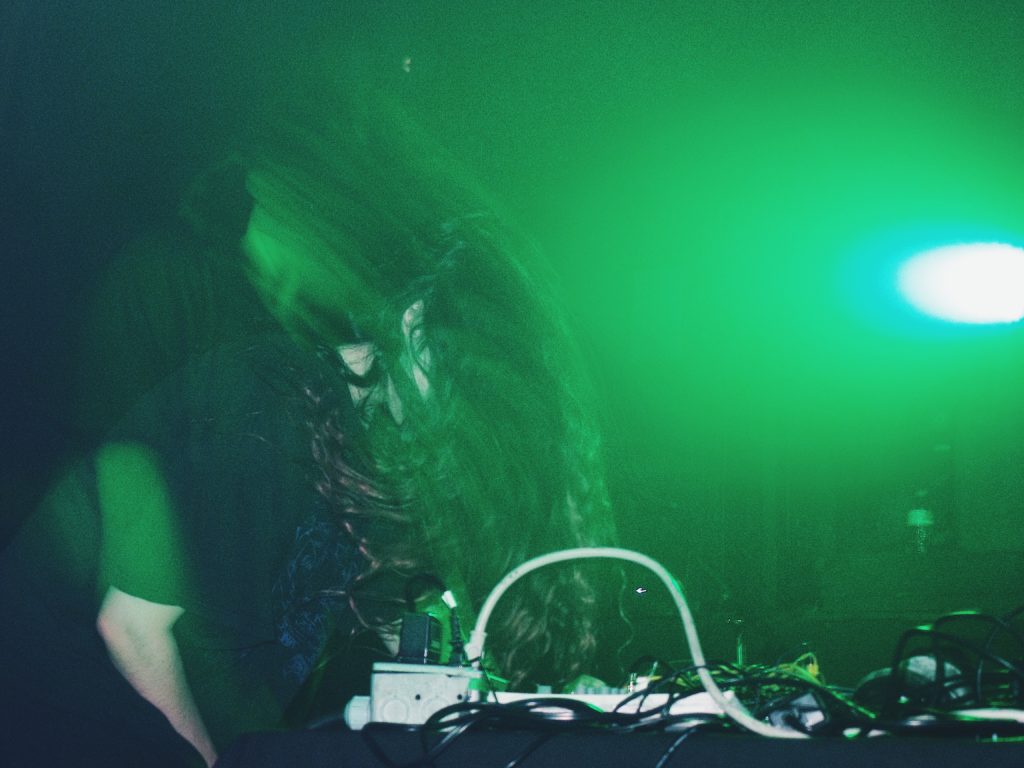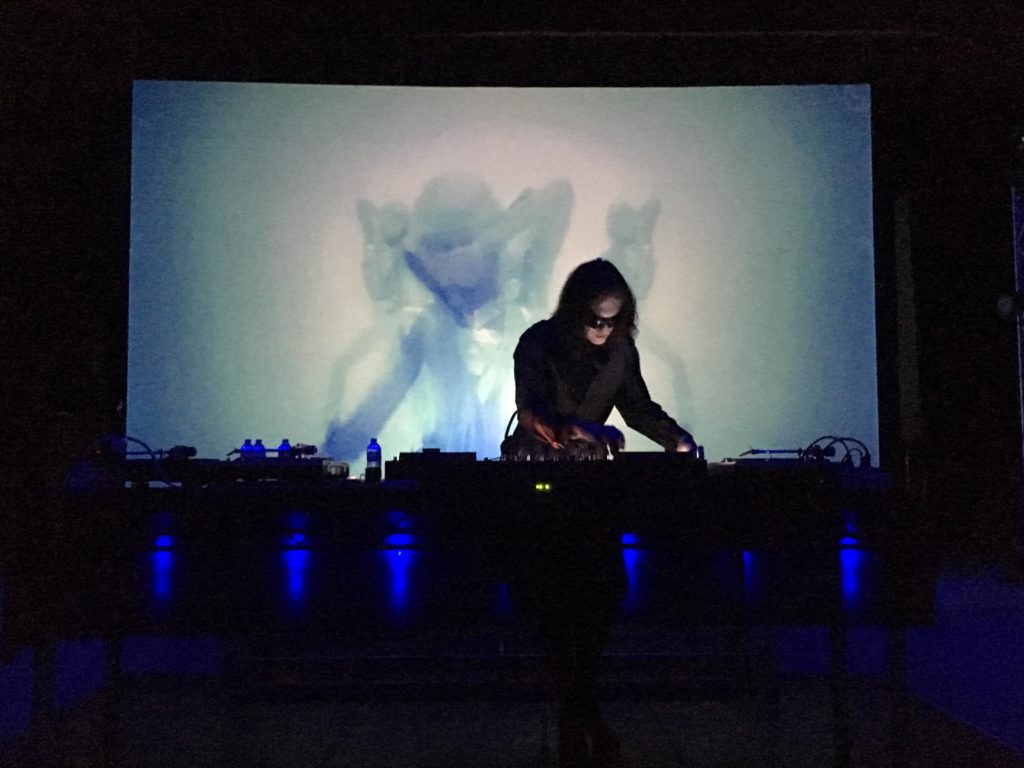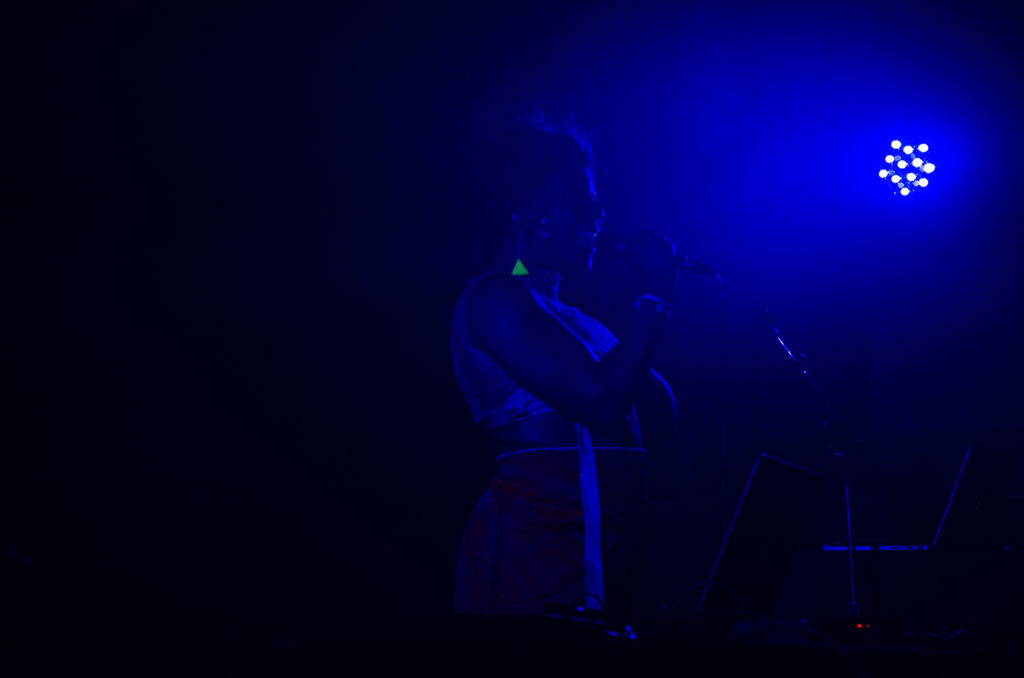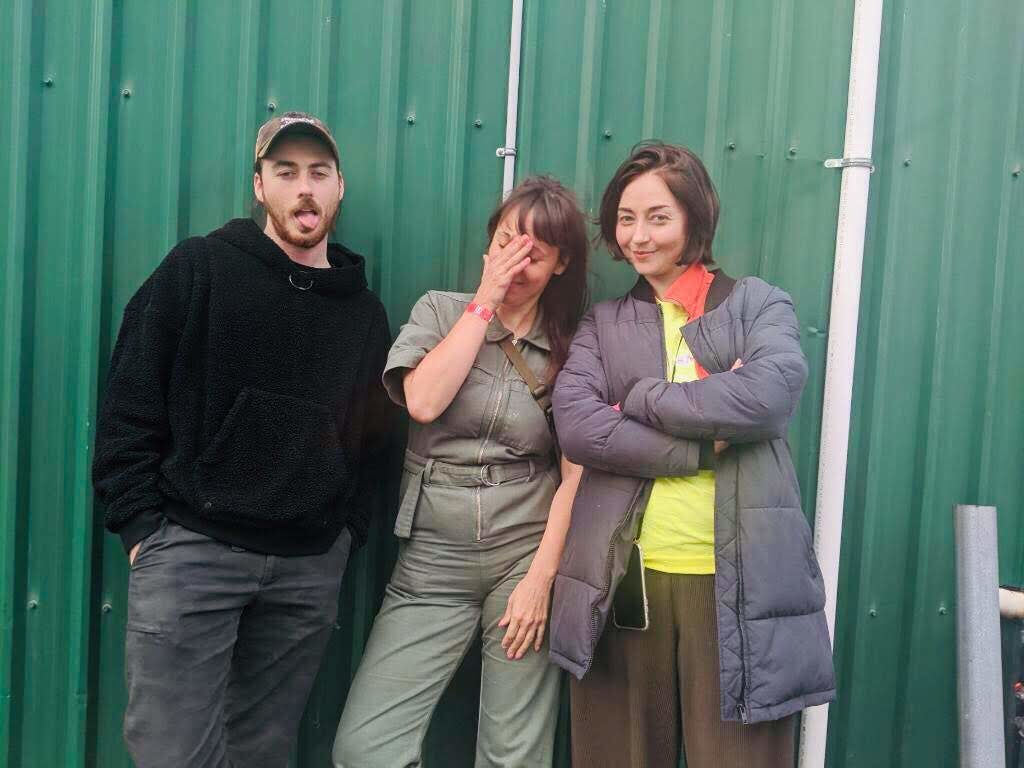For all its hype, New Forms’ first showcase kicks off like hundreds of other shows. People trickle in, much marveling at the space and visuals, hugging of acquaintances reuniting at the gig. On the backend, the production and rush around to handle last-minute details, putting out small to mid-size fires. Much handwringing about last minute tech. And, of course, the generalized anxiety disorders applicable to most event organizers: Will people come? Will they like it? Can we sustain this whole moment in air for a second, fly without crashing?
I see this intense—relatable—consternation on the face of new co-directors JS Aurelius and Lauren Goshinski as we all watch A.F. Jones and Dave Abramson, a duo presented with heady Vancouver mainstays Quiet City, launch into their improvisational percussive set. And again and again, this expression, over the festival’s five-day marathon of experimental sonics, dance music, panels, and noise. It’s a great IF: If we bring all these disparate artists to Vancouver, put them in a room together, what happens?
If the first gig started like many others, in a predictable and familiar realm, what was to come would spiral out into ambitious, uncharted waters. Give the audience some credit: It’s not easy to sit through harsh noise set, back to back to back, droning ambient, visions of artists rending themselves open on stage. And yet, gig after gig, there were no constant smoke breaks or talking over the experimental acts. Through craven curiosity or a genuine cultivation of appreciation for these, pardon, “new forms,” everyone stayed and enjoyed even the most abrasive and confrontational ear busters. PTP, flown in from New York en masse, provided likely the most memorable guest appearance, tearing down the cavernous Fox Theater with the crew’s idiosyncratic take on personal traumas mediated through charred noise.
For all one could say about the capital-E-experimentation of the festival, the moments that felt most like breakthroughs were the brass-tacks: Philly/Discwoman’s Bearcat dropping insane rap remixes, Giant Swan’s infectious energy of a rare North American live performance, and House of Kenzo‘s unapologetically southern queer vogue-cum-performance-art working the crowd into a collective fever-pitch hallucination. These moments stood in bas-relief, needed catharsis after more harrowing listening and panel discussion, but also amplifying the necessity of the more far-out works surrounding.
What was most inspiring was how cynicism-resistant the whole thing proved to be. Even artists that play these circuits of international A/V commented on the intimacy, a community fostered with care rather than shuffled from airport to AirBnB to club. Watching the local collectives of Smile and Nuzi get their time to shine, exiting the DJ booth to be greeted by dozens of supportive Vancouverite friends… Not a dry eye in the house.
JS Aurelius, Lauren Goshinski, and Ceci Corsano-Leopizzi—all humble and quick to give credit to the surrounding support system—were no doubt instrumental in the more international flair this year, bringing the global community to experience and integrate in Vancouver for the week. As they point out, it’s truly the meta-connections of artists interacting, building relationships that will last and create collaborations, that provide the greatest impact. James Arc was able to catch them at a rare moment of downtime. Even then, JS had to pause to go stage manage, and Ceci was unfortunately stuck looking for a lost wallet. But the conversation was ultimately fruitful and personal, their personal histories’ culminating in an ambitious, memorable fest. Below, read how they did it.
James Arc What was the initial process of you getting tapped to do this? What was that initial conversation?
JS Aurelius The first year I moved up to Vancouver I attended New Forms. It was about a month or two after I moved up here and a handful of people I knew were playing, a bunch of people I knew in Vancouver were attending. It was great, the next year in 2017 I volunteered. After that, they put out the announcement that Malcolm [Levy, previous director] was going to move on as chairman of the board, but they were looking for new directors. I had contemplated applying, wasn’t sure, but a handful of people talked to me about it. I was hesitant because I only just moved to Vancouver at the point, so I didn’t know if I was necessarily qualified. Malcolm had such a long history of being here and being involved, it was kind of intimidating. Just getting reassurance from Malcolm, Alex [Chen], and other people in the city who play, encouraged me to do it.
Lauren Goshinski For me, I’d started and run my own festival in Pittsburgh, VIA. I had a pretty crazy 2018 where I had a really bad accident, hurt my leg when I was playing CTM Festival, found myself in this position where I couldn’t work. At the same time, I also saw the post… and I just can’t stop producing things and doing this kind of work. To also say, through VIA, me and New Forms were acquainted already because they happen around the same time. We got to know each other tangentially because we often route bookings. I got to know Malcolm and Alex a bit better just through going to other international festivals and having meetings etc.
JSA I think they were considering it both ways—it could’ve gone to one person. If that one person was adamant they wanted to be the sole director. Once it got to a point where we were all pretty serious about it, we were all very happy with sharing these responsibilities together.
JA How did your background in event production and curation lead to this? Is there any past show or individual experience you would say is a direct precursor to the work at New Forms?
JSA Definitely my experience is less in this exact A/V world, I’ve been on the other side as an artist playing and touring, I’ve spent a lot of time booking and event production in more DIY style, punk, and noise. I have been working for other festivals, but not on this scale.
I think all the past projects lead to this. A lot of times it’s a matter of infrastructure, resources, support. Most of the artists playing this festival are playing after hours warehouses or DIY spaces or community spaces that aren’t New Forms production level. When you’re watching someone in a DIY space, you recognize the potential it has, whether it was on a stage in a stadium or in this kind of setting. So trying to to help those visions to manifest in a different context is really special.
LG The intention for VIA was always to find the dead zone between all these different worlds of people and professions and the intersections of it that three years down the line would become a well-known aesthetic or cultural movement. You usually find those in the gaps. At least for me, there’s a big strategy behind that, with a whole cast of characters. Like a Fellini film or something, where you’re trying to orchestrate chaos.
There’s a lot of freedom, for me, curating visuals, I have a particular approach to hit that puts a lot of trust and freedom in the hands of the visual artists. There’s initial conversations but a lot of it is just instinct. You see someone at a certain phase in their career, or even if they haven’t started their career yet, that they’ve done something technically or going into a particular realm of cultural critique, being like, “This person is gonna be the person that teaches us something new.” You have to take a chance to put people and an opportunity together, and see what they make out of it. Like Delana [Tran] and Hirad [Sab] last night—I’ve known their work for a while, and I’ve always wanted to either bring them to Pittsburgh or bring them to something that I’ve done. And that was an opportunity for them to try something completely new. I said to them, the best thing you can find in this is some wormhole that can take you to another part of your practice. You don’t have to do a perfect visual set, no one gives a shit. I don’t give a shit. I want you to use the festival as a huge laboratory.
JA Why is spotlighting North American artists important to you, and why doesn’t it happen more often?
JSA It goes back to what I was saying before, to resources and opportunity. In North America—especially in the US, but also in Vancouver—there’s just less resources and capacity for this type of work. There’s a lot more in Europe than here. It’s just harder. Having that opportunity to be there for friends of ours, people we know, people that we’re excited about, that maybe don’t have the chance to fly over to Europe, to have that support is interesting and important to all of us.
LG Getting invited to curate a festival in a city and a country I don’t live in, I start there. So the system underneath it involved a lot of time trying to set up the chance first to connect with different groups here, that we can do that as kind of a family unit, see what fits naturally, and leave enough room for change in that. And that influences a lot of larger decisions as far as who’s getting booked, how is this actually gonna come together.
JA Coming in kind of fresh, and more or less as outsiders how were you taking into account the history of New Forms in the city?
JSA: Obviously, New Forms has a long and respected history in the city—to a degree that has its own intimidation factor: “Can it live up?” But New Forms has never really been about that. It’s always, “Let’s start from scratch.” It’s taken so many different shapes and forms and doesn’t have a specific format, it doesn’t have to happen a specific way. They were very clear with us: “You can throw everything out, you don’t have to go with anyone specific, work with anyone specific.” But that being said, me having lived here, and knowing the people we know, there was definitely a core group of people to start with that we knew had to be involved that are doing stuff in Vancouver now that we all think is important and special. From that, it expands out, because those people know people that need to be involved.
LG New Forms has had a rotation of guest curators, but they’ve always been local or regional. I was like, “Well, this is an opportunity to make some personal connections with scenes in Pittsburgh or other scenes I have connections in that could be helpful.” Bringing out the Honcho guys and pairing them with Public Disco is intentional, but it’s not like we slapped them on Public Disco. We had these conversations, like “Who would be interesting?” You create another node on the map, hopefully some network that will go off and create its own life now.
JSA Yeah, as important as the work and music and art that’s presented, as important are the networks and the communities that get strengthened or solidified. I think it’s an underappreciated aspect of doing something like this. You’re not just trying to parachute in a bunch of random people that don’t leave their hotel, show up for their set and leave again. There’s people here for five days and they’re talking to each other and there’s spontaneous collaborations or inspirations. Last night I heard Tommy Wright talking to Scattered Purgatory about how he could rap over their music. Where else in the world would that ever happen? People go home but those connections remain and grow.
JA What’s the appeal of curating visuals in a festival context, accompanying live music, rather than in a more traditional, white box gallery setting?
LG I have a degree and background in art history, but the museum and gallery format is not a really fruitful format for the things that excite me. I don’t know really what else it could be other than generative events. Also, a lot of these artists and musicians are inspiring each other in one way or another. It’s not just people complimenting each other, it’s also about contrast, and trying to put people together that might clash—like peanut butter and pickles. It might be freaky and weird but you might really like it.
A lot of these artists have blooming gallery careers, too—work that goes through gallery systems, like Sam [Rolfes] has made his way very quickly through every echelon of visual media, his music videos, his campaign work, and doing stuff for Adult Swim. That kind of artist is really exciting to me and I want to get people to understand them in this really exploded context. A festival, again, is about how are we gonna bring these people together—this is the best way to do it.
JA With the venue troubles you’ve faced, New Forms lost the main space they had planned on using for the festival, what are the good parts of having it in this format?
LG Community relationships, again, that have a deep connection to the people that live here. What they’re trying to do at The Pace, they got in here like nine months ago, but they’ve been trying to iterate a space like this for some time. Japanese Hall is over 100 years old and one of the first Japanese cultural centers here. To me, that’s way more true to the people that come to New Forms—past, present, and future. As best you can, you should be working in community spaces and paying them money to continue. Whatever resources we can give or exchange to mutually help one another, those are better relationships, but they’re much harder.
JA What is it that’s interesting about handing the mic over to another group—like PTP, Smile, Nuzi—and what do you think they’re doing that’s particularly exciting?
LG With any label or collective, I think it’s kind of wrong to curate them for themselves. You can extend the invitation and be like, here’s the parameters. It’s not even like handing over the mic, it’s inviting them to come teach you. And they taught us a shit-ton in a short period of time.
JSA I feel the same way about the local collectives. There’s a lot of people in Vancouver doing stuff, there’s a bunch of other collectives and crews and individuals that could just as easily be involved. I think for a lot of the same reasons as the lineup, certain groups or people were more available or interested. Everyone we’re working with this year is at some of their most active and critical working capacity right now. One of the first shows I went to in Vancouver where I felt something really, really special was seeing Quay Dash at a Nuzi night. The room just felt so different from anywhere else you would go.
LG The way I look at it, you’re a curator, an organizer, a producer. You have to do all these things at once. I’m like, OK, I’ve cut my teeth on these things, I have skills, I know I have a work ethic, some level of insanity that I can come and offer my services. But the next part of it is, how do you take something that’s been given to you, and then crack it open so you can give it to someone else? Where other people can say, I’ve had a connection to that, and then maybe those people are the curators next year. Maybe someone deeper in that hole. That’s how it works. That’s how it worked for us. Poke some holes so other stuff can start coming through.
JA This is a huge experiment, in terms of pairing experimental artists in a foreign space, with multiple venues, different curators… What are moments you are most proud of along the way?
LG From one minute, getting hailed on, and three hours later I’m watching Giant Swan—which I’d worked on for months. I just remember him [points to JS] appearing next to me, and me being like, “I’m so happy right now.” It’s still happening regardless of whatever insane stuff is being thrown at through mother nature. This is how festivals are.
JSA So many discussions I’ve had over the years, whether it’s with Val from PTP, or House of Kenzo, or Daniel Meneche, constantly trying to put something in motion. Seeing the evolution of those thoughts and conversations, to the point where now it’s manifesting in a way.
LG Our feels aside, if it’s visible that other people, attendees, or our partners, or artists, when you see them genuinely happy you know something’s at least working right. You can go to lots of festivals and see great shows, but not feel some vibration between people. You know everyone’s on the same level. That’s priceless.

